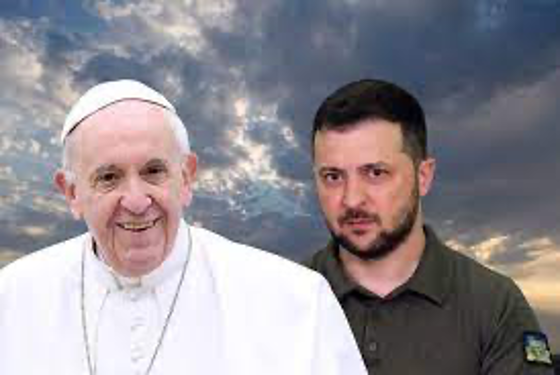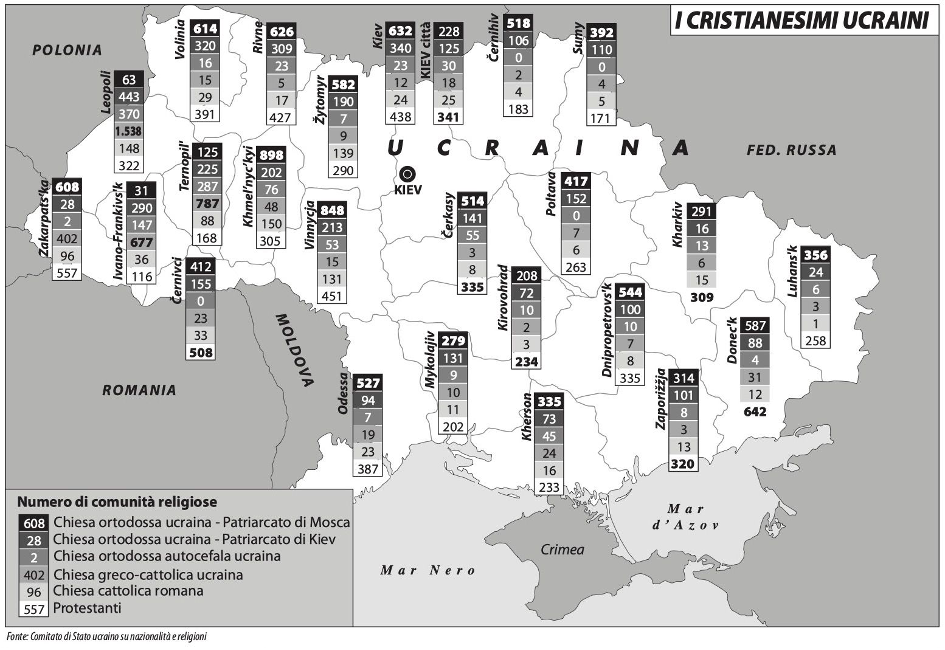President Selensky with the Pope – on the situation of the Church in Ukraine
First of all, Zelensky had the Italian government fulfill his financial and military wishes, then he explained to the Pope how peace works.
René Zittlau

An Italian View on Religions in Ukraine
Clearly, President Zelensky was so taken with what he had achieved with the Italian government that he bluntly told Pope Francis what he thought of any mediation between Russia and Ukraine:
„The war is in Ukraine and the peace plan must be Ukrainian. We are very interested in winning the Vatican over to our peace formula.”
President zelensky to the pope
It is diplomatic practice that a mediator must be recognized by both sides and, above all, accepted as independent in order to even be considered for this difficult mission. The Ukrainian head of state also knows this. Accordingly, he was concerned solely with the Vatican’s stage, not with finding solutions for his battered country.
On the occasion of the papal visit of the Ukrainian president, an Italian blog published a very interesting map:

It shows the distribution of church institutions in Ukraine according to religious affiliation in the individual regions. The legend of the chart distinguishes the following churches (from top to bottom):
Ukrainian Orthodox Church (UOK); hereinafter also “former Russian Orthodox Church”; this church is subordinate to the Moscow Patriarchate, but enjoys a great deal of independence in this regard
Orthodox Church of Ukraine (OKU), which was created virtually from nothing by then-President Poroshenko in December 2018; hereinafter also Ukrainian State Church
The Autocephalous Church of Ukraine
The Greek Orthodox Church
The Roman Catholic Church
The Protestant Church
In my article “Forced Change of Faith in Ukraine” I showed that the church policy pursued by the leadership of Ukraine not only violates the Ukrainian constitution, but in its consequence represents nothing less than ethnic cleansing. The declared goal is the destruction of the former Russian Orthodox Church (UOK) as the spiritual core of the Russian-speaking population of Ukraine.
Against the backdrop of this ongoing religious war, the data published in the map contain considerable political dynamite. They reveal the core of the church policy of Ukraine, and above all of its president, on the basis of figures that are comprehensible to everyone. They expose it for what it is: inhumane and nationalistic.
The chart includes figures from 25 administrative regions of Ukraine, including those that have since turned to Russia (Kherson, Zaporizhia, Donetsk, Lugansk). Based on this, they are unlikely to be entirely up-to-date.
In only 6 of the 25 territories is the Russian Orthodox Church not the majority church. Even in the far west of Ukraine, in Zakarpattia, in the border area with Slovakia, Hungary and Romania, the Russian Orthodox Church is by far the strongest religious community. The same is true of Volhynia, the border region with Poland, in the extreme northwest of Ukraine.
The 2019 election campaign
The nationalist seeds that Poroshenko planted in terms of church politics during his time as president by creating the Orthodox Church of Ukraine (OKU) out of thin air and at considerable financial and logistical expense in December 2018, and that Zelensky has since tried to bring among the people in a much more aggravated form, these seeds have so far not taken root as desired.
A look at history would have shown the planners of this battle for minds that beliefs based on faith are very difficult to change. The example of the Soviet Union in particular shows this very clearly. The Russian Orthodox Church there survived a terror for which there are few historical parallels.
“This interview was conducted entirely in Russian – in Zelensky’s mother tongue”.
By establishing the Orthodox Church of Ukraine (OKU) in December 2018 in the run-up to the 2019 presidential elections, Poroshenko made the Russian Orthodox Church (UOK) his natural enemy and drove it to support the election of Zelensky. The latter famously touted not only peace for the Donbass but also that he would not interfere in religious and faith issues. Before the election, for example, the future president said.
“There are some things that cannot be broken. Laws and traditions are not broken. There are things that are personal.”
Zelensky before he was president
It is also interesting to note that the portal cited as a source refers to a one-hour television interview with Zelensky, who was a candidate at the time. This interview was conducted entirely in Russian – Zelensky’s mother tongue.
After the founding of the Orthodox Church of Ukraine (OKU) with massive state aid and the declared goal of uniting the Orthodox faithful under this new church umbrella and thus eradicating a centuries-old faith tradition, the words of future President Zelensky sounded almost like music to the ears of the Russian Orthodox Church (UOK) and gave rise to hopes. Indirectly, these hopes were also supported by statements of the head of the newly created “State Church of Ukraine,” Filaret Denisenko, who said in a television interview immediately before the election:
“The Ukrainian Church of the Moscow Patriarchate hopes that he (Vladimir Zelensky – ed.) will support them. We also believe that he will support them.”
Source: spzh.news
Today, four years after the election of Zelensky as president of Ukraine and knowing what has happened since, these hopes for an honest broker in the person of Volodymyr Zelensky may sound foolish. But what alternatives were there at the time?
Zelensky was well aware of the enormous religious problems and related tensions that threatened to tear Ukraine apart even then. And so, even before he was sworn in, the election winner and future president met separately with the leaders of the Orthodox churches on April 30, 2019.
At the meeting with Epiphany Dumenko, the head of the OKU, that is, the “Orthodox Church of Ukraine,” the future president of Ukraine said, according to his press service:
“During the meeting, they talked about the problems facing Ukrainians, especially the long-standing conflict in the Donbas. The newly elected head of state and Metropolitan Epiphany agreed that the Church should pray and the state should do everything so that all regions of our country could live in peace and tranquility.”
Source: spzh.news
At that time, the future first man in the state was visibly not yet interested in working with the OKU to solve the problems at hand. Apparently, the statements made by Epiphany during the election campaign were still having an effect. Epiphany stated frankly and freely that he could only imagine Poroshenko as president and that he saw him historically in the same line as Prince Vladimir.
The meeting with Metropolitan Onufri, the bishop of the Ukrainian Orthodox Church of the Moscow Patriarchate (UOK), so much fought against today, took a completely different tone. The press service of the future president stated:
“During the meeting they discussed the development of universal values, focusing especially on the situation in the East. Volodymyr Zelensky and Metropolitan Onufry noted that the state and the Church should make every effort to establish peace and restore the unity of Ukraine.”
source: spzh.news
The differences in the content of the conversation are obvious. While Zelensky told Epiphany of the OKU that “the church should pray and the state should do everything so that all regions of our country can live in peace and tranquility,” in his conversation with Metropolitan Onufry he was concerned that “the state and the church should make every effort to establish peace and restore the unity of Ukraine,” that is, together.
Thus, after this meeting, Onufry could well be of the opinion that he was talking to a future president who was interested in solving Ukraine’s fundamental problems.
Conclusion
Since that April 30, everything has changed. The hopes of the Russian Orthodox Church did not withstand the developments. The hopeful at that time, who probably owed a considerable part of his votes to the expectations of the UOK, today shows himself to be a hater of everything Russian. This does not bode well for the future peaceful coexistence of the various Orthodox churches in Ukraine.
3 thoughts on “President Selensky with the Pope – on the situation of the Church in Ukraine”